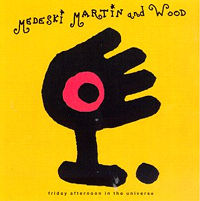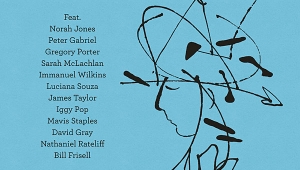| Columns Retired Columns & Blogs |
Recording of July 1995: Friday Afternoon in the Universe
MEDESKI MARTIN & WOOD: Friday Afternoon in the Universe
John Medeski, organs, piano, wurlitzer, clavinet; Billy Martin, drums, percussion; Chris Wood, acoustic bass, harmonica, wood flute
Gramavision GCD 79503 (CD only). MMW, David Baker, Jim Payne, prods.; David Baker, eng.; Dr. Toby Mountain, mastering. DDD? TT: 57:06
John Medeski, organs, piano, wurlitzer, clavinet; Billy Martin, drums, percussion; Chris Wood, acoustic bass, harmonica, wood flute
Gramavision GCD 79503 (CD only). MMW, David Baker, Jim Payne, prods.; David Baker, eng.; Dr. Toby Mountain, mastering. DDD? TT: 57:06
"People in this country," John Medeski told Down Beat in 1994, "are dying for groove music that has an expansive quality, that gets into harmonics that you can't necessarily sing while you're washing the dishes." Based on Friday Afternoon in the Universe, I'd have to say that I wasn't just hungry for it, I was starved. Man, I just gobbled this disc up!
 MMW create literate, funky jazz that swings with a vengeance. It's hard to believe that only three musicians play on most of this record. John Medeski solos in short melodic fragments, incorporating quotes from other songs as casually as conversationalists employ different speaking voices, while Ed Wood and Billy Martin lay down a groove as deep and majestic as the Grand Canyon. It's happy music—pleasing to the ear, suggestive to the feet, and downright undeniable to the, ah, boo-tay. The tricky cross-rhythms that these three musicians set in motion really demand that you get up and boogie.
MMW create literate, funky jazz that swings with a vengeance. It's hard to believe that only three musicians play on most of this record. John Medeski solos in short melodic fragments, incorporating quotes from other songs as casually as conversationalists employ different speaking voices, while Ed Wood and Billy Martin lay down a groove as deep and majestic as the Grand Canyon. It's happy music—pleasing to the ear, suggestive to the feet, and downright undeniable to the, ah, boo-tay. The tricky cross-rhythms that these three musicians set in motion really demand that you get up and boogie.
Which is not to say that MMW pander to their audience with mindless groove music; for all of Friday Afternoon's irresistible funkitude, it can be quite challenging—the complex harmonies contained in Medeski's tunes give him an edge to this music. MMW also skew the normal keyboard trio dynamic, in which the bassist and drummer support the keyboardist; each of them is capable of carrying the combo forward—and does.
Billy Martin is an incredible drummer; most of the disc's sense of life comes from his spare, swinging trapset. He never overplays, yet the songs derive much of their drive from the airy, skittering cross-rhythms that he sets deep into their bodies. Chris Wood nails those rhythms down with his monstrously fat licks, taking the delicate propulsiveness established by Martin and just booting into the groove. His bass has body and heft, yet dances nimbly into the spaces described by the drums.
Burbling around the beat—sometimes dashing ahead, sometimes lagging slightly behind—is John Medeski's Hammond B-3. The man is a stone genius when it comes to creating unique voicings on the instrument; he gets a living, breathing, organic quality out of that lumbering dinosaur. It's obviously important to him to imbue technology with a human face—he even detunes the two keyboards of his Korg synthesizer in order to make it sound more "natural."
Sounding natural is what this disc is all about. It has an open, airy quality that perfectly reflects the music. It doesn't sound like it was recorded in a studio; there's a lot of "room" in the mix—in fact, that's the first thing I noticed as Billy Martin kicked off "The Lover" with a wicked pattern on cowbell and cymbal. My head went up and I stood rigid as a dog on point. ("Wow! This is what this stuff is all about!") And like a retriever, I stayed set as long as the object of my affection stayed before me—I didn't really move for the next 57 minutes, unless you count dancing in place.
Chris Wood's bass has lots of body in this recording, leaving you in no doubt as to the weight and depth of his playing. Billy Martin's phenomenal touch is well-served, too—the shadings in his attack upon the drumhead are rendered with clarity and precision. And Medeski's voicings come through intact and full of oddball harmonics. This is, flat out, one of the best recordings I've ever heard of a contemporary jazz ensemble—it kicks sand all over most of the audiophile labels.
Most of the songs are originals. Or perhaps it would be more accurate to say that all of the songs are originals—even Carl Green's "Khob Khun Krub" and Duke Ellington's "Chinoiserie" sound indigenous to the band. Die-hard Ellington fanatics like me might have a difficult time recognizing the Duke's hand in his tune, which is not to say that MMW play it badly. Quite the opposite—they make it entirely their own. Their songs are difficult to describe. They start out being one thing and then change courses, voices, meters, as other songs are quoted and contrasting moods evoked. Like living things, they mutate, react, and move—all over grooves so profound that you will, too.
Life is too short not to react with delight when something truly new and special comes along. Sing, swing, shout, make noise! Get this disc.—Wes Phillips
- Log in or register to post comments




































